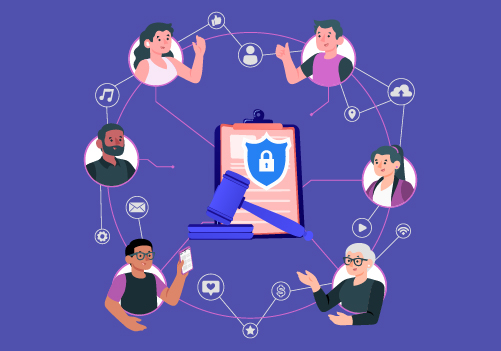Best Practices for Secure Communication and Data Storage in the Legal Industry
In response to the escalating cybersecurity threats faced by law firms handling sensitive client information, the adoption of specialized Legal IT Services and Managed IT Services for legal firms has become imperative. These tailored solutions incorporate cybersecurity best practices for legal firms, offering a comprehensive suite of protections including secure communication for law firms, encrypted data storage, encrypted messaging for lawyers, advanced case management systems, and regulatory compliance support.
Implementing these best practices for legal data security not only strengthens a firm’s digital defenses but also ensures secure client communication in legal services, preserving client trust and confidentiality. According to the American Bar Association’s 2021 Legal Technology Survey Report, 25% of respondents indicated their firms have experienced a data breach at some point.
This blog post will explore best practices for secure communication and data storage in the legal industry. By adopting these practices, law firms can protect sensitive information, comply with legal standards, and foster a culture of security across their operations.
Secure Communication Practices
Secure communication practices are critical for protecting sensitive information in the legal industry. Here are some best practices for cybersecurity for law firms:
- Use of encrypted messaging services: Law firms should consider using secure messaging apps that offer end-to-end encryption. It means messages are only visible to the sender and recipient. Some popular options include Signal and Protected Phones.
- Secure email communication: Emails are often used for sending sensitive information, so it’s essential to use a secure email provider that uses encryption. Additionally, lawyers should avoid sending sensitive information through unencrypted email or using public Wi-Fi networks to access their email.
- Use of VPNs and other secure remote access technologies: Virtual private networks (VPNs) can help secure remote access to solid networks and prevent unauthorized access. Other secure remote access technologies, such as remote desktops and two-factor authentication, can enhance security.
- Password management and multi-factor authentication: Strong password management practices can prevent unauthorized access, including regularly updating passwords and using unique passwords for each account. Additionally, multi-factor authentication adds an extra layer of security by requiring an additional verification step beyond a password.
By implementing these secure communication practices, law firms can enhance the security of their communication channels and reduce the risk of data breaches.
Data Storage Best Practices
Data storage best practices are critical for protecting sensitive information in the legal industry. Here are some best practices:
- Use of encrypted cloud storage solutions: Storing data in the cloud can be convenient, but choosing a cloud storage provider with data encryption is essential. Some popular cloud storage providers include Dropbox, Google Drive, and OneDrive.
- Data backup and disaster recovery plans: Law firms should implement regular data backups and have a disaster recovery plan. This plan should ensure that data can be quickly restored during a breach or natural disaster. This can include backing data to an offsite location or a secure cloud storage provider.
- Secure access control and user management: Limiting access to sensitive information to only authorized personnel can prevent unauthorized access. This can include setting up access controls, using role-based access control, and implementing user management policies.
- Regular vulnerability assessments and security audits: Regular vulnerability assessments and security audits can help identify potential security weaknesses in the firm’s data storage and management practices. This can include penetration testing, network endpoint scans, and security assessments.
By implementing these data storage best practices, law firms can enhance the security of their data and reduce the risk of data breaches.
Compliance Requirements
Best practices for legal data security, and regulatory compliance requirements are critical to protecting sensitive information in the legal industry. Here are some key compliance requirements that law firms should consider:
- GDPR: The General Data Protection Regulation (GDPR) is a European Union regulation governing personal data collection, storage, and processing. Law firms that handle the personal data of EU citizens must comply with GDPR requirements. This includes obtaining consent, providing transparency in data processing, and implementing appropriate security measures.
- HIPAA: The Health Insurance Portability and Accountability Act (HIPAA) regulates the handling of healthcare data in the US. Law firms that handle healthcare data must comply with HIPAA requirements, including implementing appropriate safeguards to protect data privacy and security.
- CCPA: The California Consumer Privacy Act (CCPA) is a privacy law that governs the collection, storage, and processing of the personal data of California residents. Law firms that handle the personal data of California residents must comply with CCPA requirements. This includes providing transparency in data processing, offering opt-out options, and implementing appropriate security measures.
Complying with these regulations is critical for protecting sensitive information in the legal industry. Failing to comply can result in significant fines and reputational damage for the law firm. Legal technology solutions can help law firms achieve compliance with these and other regulatory requirements.
Staff Training and Awareness
Staff training and awareness are critical to a strong security posture in the legal industry. Here are some best practices for staff training and awareness:
- Importance of training employees regularly: Law firms should provide regular training on secure communication and data storage practices. This can include training on encrypted messaging services, secure email communication, secure remote access, and password management.
- Regular security awareness training and phishing simulations: It can help employees recognize potential security threats and take appropriate action. Phishing simulations can also help employees identify and avoid phishing attacks, a standard method attackers use to access sensitive information.
- Developing a culture of security within the organization: Law firms should prioritize security and make it a part of their organizational culture. This can include promoting security awareness and making security a part of employee performance evaluations.
By prioritizing staff training and awareness, law firms can reduce the risk of security incidents and improve the organization’s overall security posture.
Conclusion
In conclusion, the legal industry handles significant sensitive and confidential information daily. By following the above best practices, law firms can protect their sensitive information, maintain regulatory compliance, and build a security culture within their organization. By investing in security measures and creating a safety culture, law firms can minimize the risk of data breaches and protect their client’s confidential information.
Protected Harbor is a leading technology and legal IT services company that provides cloud-based data protection and compliance solutions for the legal industry. Our platform is designed to meet the unique needs of law firms. It can help them protect sensitive client data, maintain regulatory compliance, and reduce the risk of data breaches.
We deliver unmatched results with robust security features like secure network endpoints, threat detection and response, 99.99% uptime, and email filtering combined with years of experience. Learn how we keep your data safe, get on a call with one of our experts today.







